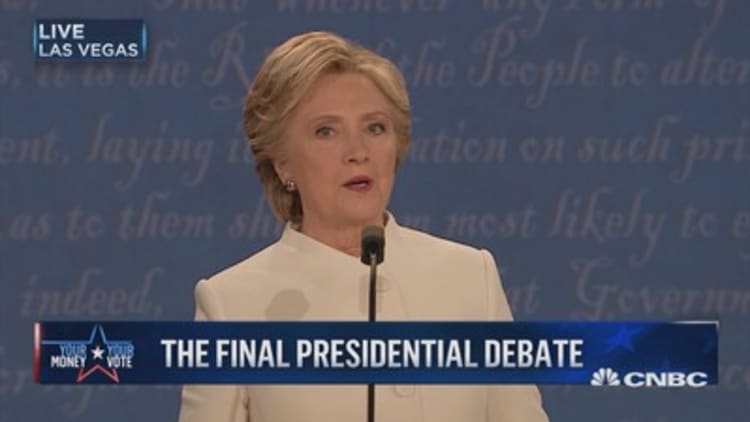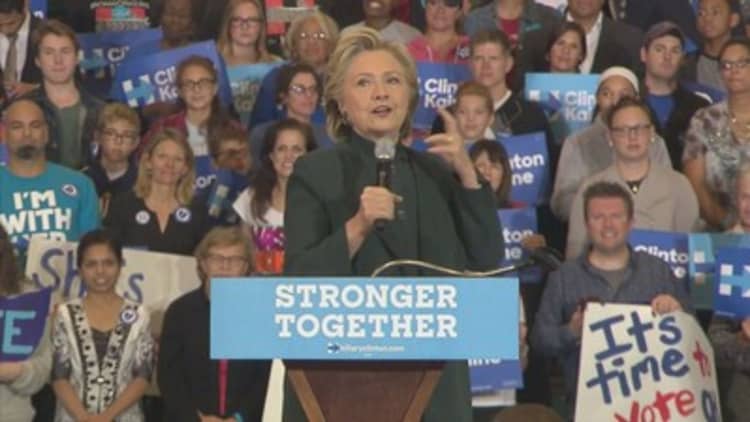This most bizarre of presidential elections may lead to changes in how money flows into elections in the future, providing a possible catalyst to break the trend of big money interests influencing elections.
On the Republican side, Donald Trump saw the benefits of a free media circus and an injection of his own cash, emphasizing digital outreach while spending little on ground operations and TV ads. His Democratic rival Hillary Clinton has pledged to reduce the flow of big money into politics if she is elected, even as a super PAC backing her run takes in record cash from wealthy donors.
Those trends may affect how political campaigns and outside groups could raise and use cash in the future. On Trump's side, it remains to be seen whether a future candidate can capture free exposure the way he has or improve on the campaign's flaws.
If Clinton gets elected, campaign finance reform could prove difficult even if she makes the issue a priority, as she has pledged to do on the campaign trail.
Clinton's big money pledge

Clinton outlined her Supreme Court priorities during this month's final presidential debate, saying that reversing the flow of big money into politics would be a key goal if she got to choose justices.
She said she wanted to appoint justices who would "stand up and say no to Citizens United, a decision that has undermined the election system in our country because of the way it permits dark, unaccountable money to come into our election system."
The Citizens United v. FEC ruling threw out the ban on corporations and unions making independent expenditures in support of or against candidates. The decision has for some symbolized the increased flow of money from large donors and independent groups into the electoral process, drawing ire from some officials on both sides of the aisle.
Reversing Citizens United or reforming campaign finance law would earn Clinton points with the progressive wing of her party, as it could reduce the influence corporations and outside interests have on elections. Outside groups have spent $1.2 billion in this election through Monday, up from $922 million at the same point in 2012, according to the Center for Responsive Politics. About 75 percent of the donations to the groups have been fully disclosed, as super PACs are required to report their donors but other groups like 501(c)(4)s are not.
Though Clinton would have some tools at her disposal to make campaign finance a priority if she wins, meaningful reform could prove arduous, experts said.
Beyond appointing Supreme Court justices who would side with her on the issue, Clinton could put campaign finance-minded officials in the Justice Department and Securities and Exchange Commission, said Norm Eisen, a fellow at the Brookings Institution and President Barack Obama's former ethics czar. He added that Clinton would also have to focus on getting another case to the Supreme Court, possibly the SpeechNow.org v. FEC case in which an appellate court said certain contribution limits were unconstitutional.
But getting a case to the Supreme Court could take "seven or eight years" even if Clinton gets her chosen justices approved, said Steven Billet, director of the master's program in legislative affairs at George Washington University's Graduate School of Political Management.
Clinton's own backers in her current presidential run could also complicate her priorities in a possible presidency, especially if she plans to run again in 2020. The huge super PAC backing Clinton, Priorities USA Action, has raised about $175 million in this cycle, more than any other super PAC has. It is fueled by multimillion-dollar donations from hedge fund manager S. Donald Sussman and financier George Soros, among other wealthy contributors.
However, Eisen said Clinton would have a difficult time abandoning the issue because of how much she's discussed it on the campaign trail.
"She's talked over and over again about addressing Citizens United. It's not so easy to back away from that. People really care about this so there will be some accountability," he said.
GWU's Billet added Sens. Bernie Sanders and Elizabeth Warren, progressive favorites who have stumped for Clinton, could push the issue of campaign finance reform in a possible Clinton administration.
The Trump effect

Trump's campaign spent very little in the Republican primary and has stayed extremely cheap in the general election compared with most recent presidential nominees. He got a huge boost from free media coverage of his divisive policy proposals and campaign trail bluster.
That model could inspire others to jump into the political fray with a bare-bones campaign fueled by antics and media coverage, Eisen said. He added that it may not bode well for political discourse in the United States.
"I think that everybody who likes to get a lot of free attention from the press is going to look now at the campaign season as a marketing opportunity where even if you lose you win," he said. "I don't think you've seen the last of it and I feel it will further coarsen and politicize our discourse."
One estimate earlier this year said Trump earned nearly $2 billion in free media. The next closest of all the Republican and Democratic primary candidates was Clinton with about $800 million.
The media circus surrounding the billionaire developer's run partly allowed him to get through the Republican primary largely with personal loans to his campaign and minimal spending compared with recent candidates. Trump himself has given $66 million to his campaign and still pledges that he will have given $100 million by Election Day.
His campaign did not start seriously fundraising until June, months after Clinton started raising money. It did not even buy a television ad until August, but has gradually spent more until its expenditures were almost even with Clinton's in the first few weeks of October.
Still, Trump reported total disbursements of about $239 million for the campaign through Oct. 19, well below the $450.6 million Clinton spent. Obama's campaign spent $630.8 million through mid-October 2012, while Mitt Romney's spent $360.7 million.
Billet said there are limits to how far a low-spending strategy can take candidates if they decide to follow the Trump approach. While some polls and betting markets have shown a slight shift to Trump since the FBI said it was looking into new emails related to Clinton on Friday, Trump still faces an uphill battle in most battleground states.
"He's probably squeezed as much as you can get out of this particular approach," Billet said.
He added that in order to win with a Trump-like strategy, a candidate would have to start traditional fundraising and building out a ground game earlier in the process.


